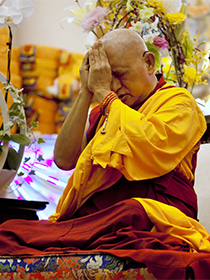- Home
- FPMT Homepage
Foundation for the Preservation of the Mahayana Tradition
The FPMT is an organization devoted to preserving and spreading Mahayana Buddhism worldwide by creating opportunities to listen, reflect, meditate, practice and actualize the unmistaken teachings of the Buddha and based on that experience spreading the Dharma to sentient beings. We provide integrated education through which people’s minds and hearts can be transformed into their highest potential for the benefit of others, inspired by an attitude of universal responsibility and service. We are committed to creating harmonious environments and helping all beings develop their full potential of infinite wisdom and compassion. Our organization is based on the Buddhist tradition of Lama Tsongkhapa of Tibet as taught to us by our founders Lama Thubten Yeshe and Lama Thubten Zopa Rinpoche.
- Willkommen
Die Stiftung zur Erhaltung der Mahayana Tradition (FPMT) ist eine Organisation, die sich weltweit für die Erhaltung und Verbreitung des Mahayana-Buddhismus einsetzt, indem sie Möglichkeiten schafft, den makellosen Lehren des Buddha zuzuhören, über sie zur reflektieren und zu meditieren und auf der Grundlage dieser Erfahrung das Dharma unter den Lebewesen zu verbreiten.
Wir bieten integrierte Schulungswege an, durch denen der Geist und das Herz der Menschen in ihr höchstes Potential verwandelt werden zum Wohl der anderen – inspiriert durch eine Haltung der universellen Verantwortung und dem Wunsch zu dienen. Wir haben uns verpflichtet, harmonische Umgebungen zu schaffen und allen Wesen zu helfen, ihr volles Potenzial unendlicher Weisheit und grenzenlosen Mitgefühls zu verwirklichen.
Unsere Organisation basiert auf der buddhistischen Tradition von Lama Tsongkhapa von Tibet, so wie sie uns von unseren Gründern Lama Thubten Yeshe und Lama Thubten Zopa Rinpoche gelehrt wird.
- Bienvenidos
La Fundación para la preservación de la tradición Mahayana (FPMT) es una organización que se dedica a preservar y difundir el budismo Mahayana en todo el mundo, creando oportunidades para escuchar, reflexionar, meditar, practicar y actualizar las enseñanzas inconfundibles de Buda y en base a esa experiencia difundir el Dharma a los seres.
Proporcionamos una educación integrada a través de la cual las mentes y los corazones de las personas se pueden transformar en su mayor potencial para el beneficio de los demás, inspirados por una actitud de responsabilidad y servicio universales. Estamos comprometidos a crear ambientes armoniosos y ayudar a todos los seres a desarrollar todo su potencial de infinita sabiduría y compasión.
Nuestra organización se basa en la tradición budista de Lama Tsongkhapa del Tíbet como nos lo enseñaron nuestros fundadores Lama Thubten Yeshe y Lama Zopa Rinpoche.
A continuación puede ver una lista de los centros y sus páginas web en su lengua preferida.
- Bienvenue
L’organisation de la FPMT a pour vocation la préservation et la diffusion du bouddhisme du mahayana dans le monde entier. Elle offre l’opportunité d’écouter, de réfléchir, de méditer, de pratiquer et de réaliser les enseignements excellents du Bouddha, pour ensuite transmettre le Dharma à tous les êtres. Nous proposons une formation intégrée grâce à laquelle le cœur et l’esprit de chacun peuvent accomplir leur potentiel le plus élevé pour le bien d’autrui, inspirés par le sens du service et une responsabilité universelle. Nous nous engageons à créer un environnement harmonieux et à aider tous les êtres à épanouir leur potentiel illimité de compassion et de sagesse. Notre organisation s’appuie sur la tradition guéloukpa de Lama Tsongkhapa du Tibet, telle qu’elle a été enseignée par nos fondateurs Lama Thoubtèn Yéshé et Lama Zopa Rinpoché.
Visitez le site de notre Editions Mahayana pour les traductions, conseils et nouvelles du Bureau international en français.
Voici une liste de centres et de leurs sites dans votre langue préférée
- Benvenuto
L’FPMT è un organizzazione il cui scopo è preservare e diffondere il Buddhismo Mahayana nel mondo, creando occasioni di ascolto, riflessione, meditazione e pratica dei perfetti insegnamenti del Buddha, al fine di attualizzare e diffondere il Dharma fra tutti gli esseri senzienti.
Offriamo un’educazione integrata, che può trasformare la mente e i cuori delle persone nel loro massimo potenziale, per il beneficio di tutti gli esseri, ispirati da un’attitudine di responsabilità universale e di servizio.
Il nostro obiettivo è quello di creare contesti armoniosi e aiutare tutti gli esseri a sviluppare in modo completo le proprie potenzialità di infinita saggezza e compassione.
La nostra organizzazione si basa sulla tradizione buddhista di Lama Tsongkhapa del Tibet, così come ci è stata insegnata dai nostri fondatori Lama Thubten Yeshe e Lama Zopa Rinpoche.
Di seguito potete trovare un elenco dei centri e dei loro siti nella lingua da voi prescelta.
- 欢迎 / 歡迎
简体中文
“护持大乘法脉基金会”( 英文简称:FPMT。全名:Foundation for the Preservation of the Mahayana Tradition) 是一个致力于护持和弘扬大乘佛法的国际佛教组织。我们提供听闻,思维,禅修,修行和实证佛陀无误教法的机会,以便让一切众生都能够享受佛法的指引和滋润。
我们全力创造和谐融洽的环境, 为人们提供解行并重的完整佛法教育,以便启发内在的环宇悲心及责任心,并开发内心所蕴藏的巨大潜能 — 无限的智慧与悲心 — 以便利益和服务一切有情。
FPMT的创办人是图腾耶喜喇嘛和喇嘛梭巴仁波切。我们所修习的是由两位上师所教导的,西藏喀巴大师的佛法传承。
繁體中文
護持大乘法脈基金會”( 英文簡稱:FPMT。全名:Found
ation for the Preservation of the Mahayana Tradition ) 是一個致力於護持和弘揚大乘佛法的國際佛教組織。我們提供聽聞, 思維,禪修,修行和實證佛陀無誤教法的機會,以便讓一切眾生都能 夠享受佛法的指引和滋潤。 我們全力創造和諧融洽的環境,
為人們提供解行並重的完整佛法教育,以便啟發內在的環宇悲心及責 任心,並開發內心所蘊藏的巨大潛能 — 無限的智慧與悲心 – – 以便利益和服務一切有情。 FPMT的創辦人是圖騰耶喜喇嘛和喇嘛梭巴仁波切。
我們所修習的是由兩位上師所教導的,西藏喀巴大師的佛法傳承。 察看道场信息:
- FPMT Homepage
- News/Media
-
- Study & Practice
-
-
- About FPMT Education Services
- Latest News
- Programs
- New to Buddhism?
- Buddhist Mind Science: Activating Your Potential
- Heart Advice for Death and Dying
- Discovering Buddhism
- Living in the Path
- Exploring Buddhism
- FPMT Basic Program
- FPMT Masters Program
- FPMT In-Depth Meditation Training
- Maitripa College
- Lotsawa Rinchen Zangpo Translator Program
- Universal Education for Compassion & Wisdom
- Online Learning Center
-
- Prayers & Practice Materials
- Overview of Prayers & Practices
- Full Catalogue of Prayers & Practice Materials
- Explore Popular Topics
- Benefiting Animals
- Chenrezig Resources
- Death & Dying Resources
- Lama Chopa (Guru Puja)
- Lama Zopa Rinpoche: Compendium of Precious Instructions
- Lama Zopa Rinpoche: Life Practice Advice
- Lama Zopa Rinpoche Practice Series
- Lamrim Resources
- Mantras
- Prayer Book Updates
- Purification Practices
- Sutras
- Thought Transformation (Lojong)
- Audio Materials
- Dharma Dates - Tibetan Calendar
- Translation Services
- Publishing Services
- Ways to Offer Support
- Prayers & Practice Materials
-
- Teachings and Advice
- Find Teachings and Advice
- Lama Zopa Rinpoche Advice Page
- Lama Zopa Rinpoche: Compendium of Precious Instructions
- Lama Zopa Rinpoche Video Teachings
- ༧སྐྱབས་རྗེ་བཟོད་པ་རིན་པོ་ཆེ་མཆོག་ནས་སྩལ་བའི་བཀའ་སློབ་བརྙན་འཕྲིན།
- Podcasts
- Lama Yeshe Wisdom Archive
- Buddhism FAQ
- Dharma for Young People
- Resources on Holy Objects
- Teachings and Advice
-
-
*If a menu item has a submenu clicking once will expand the menu clicking twice will open the page.
-
-
- Centers
-
- Teachers
-
- Projects
-
-
-
-
*If a menu item has a submenu clicking once will expand the menu clicking twice will open the page.
-
-
- FPMT
-
- Shop
-
-
-
The Foundation Store is FPMT’s online shop and features a vast selection of Buddhist study and practice materials written or recommended by our lineage gurus. These items include homestudy programs, prayers and practices in PDF or eBook format, materials for children, and other resources to support practitioners.
Items displayed in the shop are made available for Dharma practice and educational purposes, and never for the purpose of profiting from their sale. Please read FPMT Foundation Store Policy Regarding Dharma Items for more information.
-
-
17
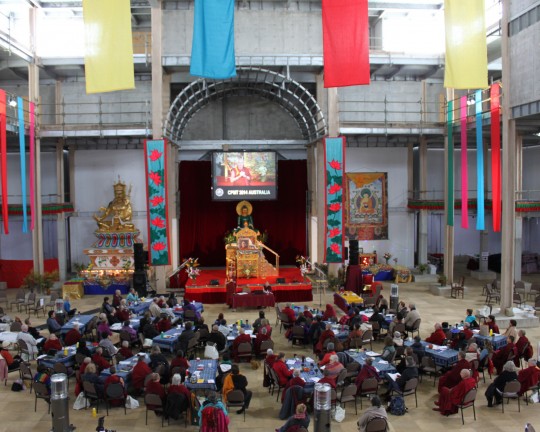
Ven. Roger Kunsang and Ven. Holly Ansett during a presentation on Day 4 of CPMT 2014, Great Stupa of Universal Compassion, Victoria, Australia, September 16, 2014. Photo by Laura Miller.
Day 4 of the CPMT 2014 meeting began with Lama Zopa Rinpoche leading the morning motivation in the Great Stupa of Universal Compassion. (A video recording of this is available on the CPMT Livestream page.) It was the perfect start to a busy and chilly day.
After breakfast, the North America regional coordinator Drolkar McCallum shared her experience with the Inner Job Description (IJD), explaining how she’s “fallen in love” with doing the practice. She then led participants through a short reflection on listening, part of the developing skillful communications section of the IJD.
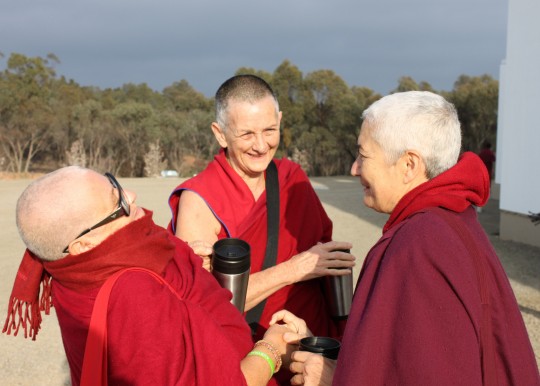
Vens. Siliana, Trisha and Paloma outside the Great Stupa of Universal Compassion, Australia, September 16, 2014. Photo by Laura Miller.
Ven. Roger Kunsang, CEO of FPMT, and Ven. Holly Ansett, FPMT charitable projects coordinator, spoke on Lama Zopa Rinpoche’s Vast Visions and the Five Pillars of Service. “The organization is about giving value or meaning to an individual’s life — giving us a clear understanding of our purpose of being,” Ven. Roger said as a way of orienting his presentation. “That’s what we do. That’s who we are. You can’t underestimate it. And I haven’t found anything better to do. The difference we’ve made in the world up to today, I’d say, it’s huge.” Lama Zopa Rinpoche arrived as Ven. Roger talked about the importance of Lama Yeshe and Lama Zopa Rinpoche to the work of FPMT and the importance of everyone offering service to FPMT and to the Lamas.
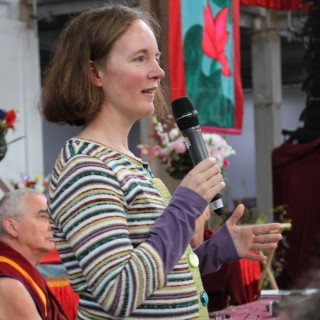
Linda Gyatso speaking on Day 4 at CPMT 2014, Great Stupa of Universal Compassion, Australia, September 16, 2014. Photo by Laura Miller.
Ven. Holly Ansett presented Lama Zopa Rinpoche’s Vast Visions for FPMT, describing the story behind it and its development with Rinpoche adding in commentary throughout. Ven. Holly described how much amazing work has already been done to actualize Rinpoche’s expansive wishes.
Linda Gyatso, the new director of the Foundation for Developing Compassion and Wisdom, introduced the organization. Linda explained that FDCW helps to develop and promote Universal Education for Compassion and Wisdom, the secular education programs and initiatives that have grown out of a vision articulated by Lama Yeshe.
After a tea break, Ven. Roger offered more insight into the importance of good local governance, emphasizing the critical role of a well-organized and educated local board of directors. He then discussed how the Five Pillars of Service are a way of translating the vast visions into goals to which centers can aspire that engage their communities most broadly. The Five Pillars are:
- Dharma
- Universal Education for Compassion and Wisdom
- Social and/or community service
- Interfaith activities
- Revenue generation activities
He explained that this isn’t new in the sense that many centers, projects and services are already engaged in many of these pillars.
Francois Lecointre, director of Institut Vajra Yogini (IVY) in France; Denise Macy, director of Land of Medicine Buddha (LMB) in California, US; and Fabienne Pradelle, director of Vajrapani Institute in California, explained how the work of their respective centers matches up with the Five Pillars.
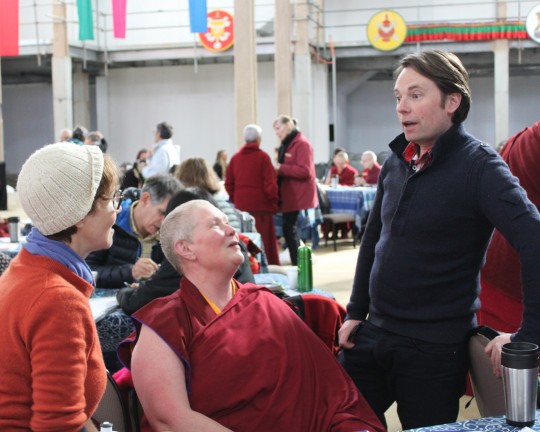
Wendy Cook, Ven. Lindy, Matthew Poxon during tea break on Day 4 at the Great Stupa of Universal Compassion, Australia, September 16, 2014. Photo by Laura Miller.
After a tasty lunch, three panelists addressed an issue critical for the development and growth of centers, projects and services in the session “Developing Fund Raising and Revenue Generation.”
Hup Cheng Tan, center director of Amitabha Buddhist Centre in Singapore, explained how ABC makes extensive offerings, hosts festivals and creates many, many activities for students to make offerings and to offer sponsorships. For many present, the scope and results of ABC’s activities were mind blowing. Hup Cheng also mentioned that ABC has a retail shop and used feng shui when designing their building, but emphasized that generosity and merit generation were at the heart of their revenue generation work.
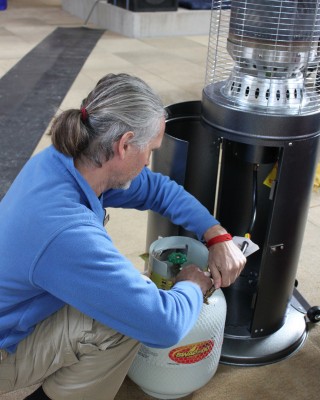
Harald Weichart helps change the fuel for the space heaters at CPMT 2014, Great Stupa of Universal Compassion, Australia, September 16, 2014. Photo by Laura Miller.
Tony Steel, center director of Vajrayana Institute, Sydney, Australia, explained how the center started to organize and host large conferences as a form of revenue generation, specifically “Happiness & Its Causes,” which has had His Holiness the Dalai Lama as a featured speaker, and also the conference “Mind & Its Potential.” Tony explained that he has drawn on his background in business while leading the center’s work in this area. As a way to evolve, Vajrayana is trying a new initiative: organizing exhibition events that generate money through selling sponsorships and exhibition space. They are currently working on one focused on wellness.
Sarah Brooks, spiritual program coordinator of Kadampa Center in Raleigh, North Carolina, US, explained how Kadampa Center operates on a donation only basis. She explained that at first the center tried raising funds by asking for a specific donation at events, but now they have no suggested donation, letting attendees decide their level of contribution. They also offer opportunities to sponsor teachers, pujas and holy days. Since they’ve moved to this model, they have been receiving more donations than before. The center also encourages students to set up a regular, automatic monthly donation, instead of trying to raise money with once a year type fundraising campaign. The center also makes sure to emphasize the practice of generosity and to show sincere gratitude to donors and active community members.
Ven. Holly was then invited to briefly list all of the incredible merit-generating activities that are being done through the FPMT Puja Fund. All present took a moment to rejoice in the beneficial activities being supported by this fund.
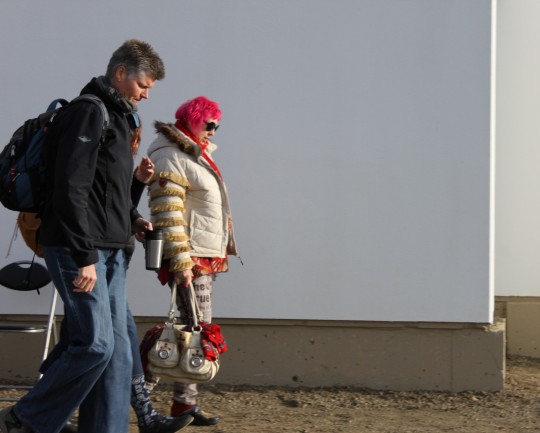
Jane Willis and Miffi Maximillion from Langri Tangpa Centre outside of the Great Stupa of Universal Compassion, Australia, September 16, 2014. Photo by Laura Miller.
At this point, the session was opened up to questions and sharing from the audience. Andy Wistreich from Land of Joy, a project to create a retreat center in the UK, announced that the project is completing the purchase of the property that they had found in northern England. In July 2014, Rinpoche visited and blessed the land.
“You create the merit and the money will come,” Andy explained. “It’s very important to not worry about money; worry about merit.” He continued that if you or your center asks Rinpoche a very specific question about creating merit for your project, you will get very specific advice. And if you properly carry out the advice, the money will come. He also said that Land of Joy hopes to employ a generosity model.
Denise Macy, from LMB, described some of her experiences with undertaking large projects and talked about a recent fundraising campaign. Members of the LMB community turned their very large prayer wheel continuously for 24 hours and exceeded their fundraising goals. She emphasized the importance of a “can do” attitude and a willingness to take a risk.
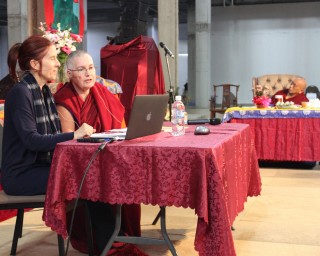
Ven. Chantal Carrerot and Drolkar McCallum leading a presentation on International Mahayana Institute with Lama Zopa Rinpoche listening on, CPMT 2014 Day 4, Great Stupa of Universal Compassion, Australia, September 2014. Photo by Laura Miller.
Miffi Maximillion, spiritual program director of Langri Tangpa Centre in Brisbane, Australia, explained the center’s popular “prostrate-a-thon,” in which participants took pledges for doing prostration for world peace. She said they saw the event primarily as a merit raising event and had “heaps of offerings” in the center during the event. In addition to creating merit, Miffi said the event also created a great community feeling.
Ven. Chantal Carrerot director of International Mahayana Institute (IMI) and Drolkar McCallum led a presentation on IMI, the community of FPMT’s monks and nuns. Ven. Chantal described the more than 40-year history of IMI and their invaluable contribution to building the international FPMT mandala; they were the “pioneers.” As of today, IMI had 280 Sangha members in 29 countries who are in retreat, studying, teachings and offering service. Participants talked with partners at their tables about the centers, projects and services that they knew of that have benefited from Sangha involvement. There were no shortage of instances to discuss. Then everyone took a few minutes to rejoice in all the activities of IMI Sangha members.
Drolkar then described current and future projects to support Sangha, drawing attention to the Lama Yeshe Sangha Fund. Afterwards, small groups gathered to discuss issues on Sangha and reported back to the large group.
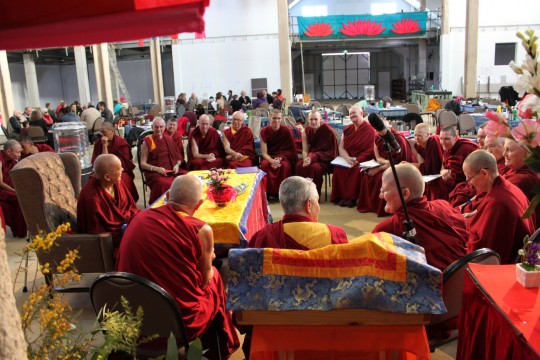
IMI Sangha members meeting with Rinpoche during the small group discussion period at CPMT 2014 Day 4, Great Stupa of Universal Compassion, Australia, September 16, 2014. Photo by Laura Miller.
Drolkar also led the end of day reflection, asking participants how they did with their practice of listening. “Was your listening unbiased? … Was it patient? … Did you listen with interest?” she asked. Lama Zopa Rinpoche, who had observed in most of the day’s meeting, led the dedication.
After dinner, Ven. Paloma Alba and Gun Cissé shared their stories about meeting the Dharma as part of the evening’s Wisdom Culture program. Like previous evenings’ presentations, despite the draft and chill in the stupa, their stories warmed the audience with laughter and inspiration.
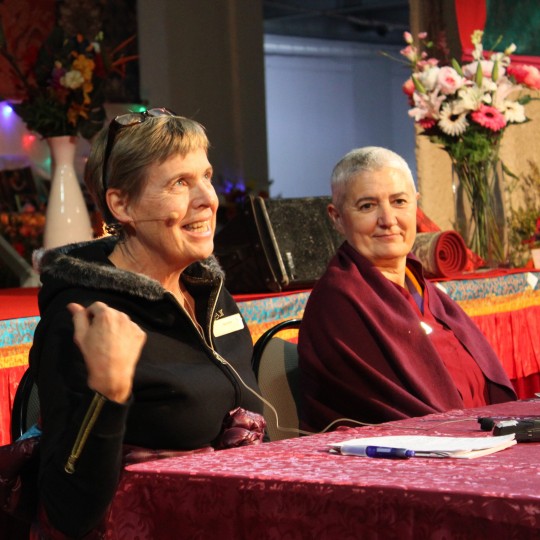
Ven. Paloma and Gun Cissé sharing their stories of meeting the Dharma, Day 4 CPMT 2014, Australia, September 16, 2014. Photo by Laura Miller.
Mandala will continue sharing updates and photos from the CPMT 2014 meeting as the meeting continues.
Mandala brings you news of Lama Zopa Rinpoche and of activities, teachings and events from over 160 FPMT centers, projects and services around the globe. If you like what you read on Mandala, consider becoming a Friend of FPMT, which supports our work.
- Home
- News/Media
- Study & Practice
- About FPMT Education Services
- Latest News
- Programs
- New to Buddhism?
- Buddhist Mind Science: Activating Your Potential
- Heart Advice for Death and Dying
- Discovering Buddhism
- Living in the Path
- Exploring Buddhism
- FPMT Basic Program
- FPMT Masters Program
- FPMT In-Depth Meditation Training
- Maitripa College
- Lotsawa Rinchen Zangpo Translator Program
- Universal Education for Compassion & Wisdom
- Online Learning Center
- Prayers & Practice Materials
- Overview of Prayers & Practices
- Full Catalogue of Prayers & Practice Materials
- Explore Popular Topics
- Benefiting Animals
- Chenrezig Resources
- Death & Dying Resources
- Lama Chopa (Guru Puja)
- Lama Zopa Rinpoche: Compendium of Precious Instructions
- Lama Zopa Rinpoche: Life Practice Advice
- Lama Zopa Rinpoche Practice Series
- Lamrim Resources
- Mantras
- Prayer Book Updates
- Purification Practices
- Sutras
- Thought Transformation (Lojong)
- Audio Materials
- Dharma Dates – Tibetan Calendar
- Translation Services
- Publishing Services
- Teachings and Advice
- Find Teachings and Advice
- Lama Zopa Rinpoche Advice Page
- Lama Zopa Rinpoche: Compendium of Precious Instructions
- Lama Zopa Rinpoche Video Teachings
- ༧སྐྱབས་རྗེ་བཟོད་པ་རིན་པོ་ཆེ་མཆོག་ནས་སྩལ་བའི་བཀའ་སློབ་བརྙན་འཕྲིན།
- Podcasts
- Lama Yeshe Wisdom Archive
- Buddhism FAQ
- Dharma for Young People
- Resources on Holy Objects
- Ways to Offer Support
- Centers
- Affiliates Area
- Teachers
- Projects
- Charitable Projects
- Make a Donation
- Applying for Grants
- News about Projects
- Other Projects within FPMT
- Support International Office
- Projects Photo Galleries
- Give Where Most Needed
- FPMT
- Shop
Subscribe to FPMT News
Translate*
*powered by Google TranslateTranslation of pages on fpmt.org is performed by Google Translate, a third party service which FPMT has no control over. The service provides automated computer translations that are only an approximation of the websites' original content. The translations should not be considered exact and only used as a rough guide.The reason we are unhappy is because we have extreme craving for sense objects – samsaric objects – and we grasp at them. We are seeking to solve our problems, but we are not seeking in the right place. The right place is our ego-grasping.







